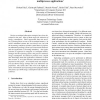Free Online Productivity Tools
i2Speak
i2Symbol
i2OCR
iTex2Img
iWeb2Print
iWeb2Shot
i2Type
iPdf2Split
iPdf2Merge
i2Bopomofo
i2Arabic
i2Style
i2Image
i2PDF
iLatex2Rtf
Sci2ools
143
click to vote
SCOPES
2007
Springer
2007
Springer
Operating system integrated energy aware scratchpad allocation strategies for multiprocess applications
Various scratchpad allocation strategies have been developed in the past. Most of them target the reduction of energy consumption. These approaches share the necessity of having direct access to the scratchpad memory. In earlier embedded systems this was always true, but with the increasing complexity of tasks systems have to perform, an additional operating system layer between the hardware and the application is becoming mandatory. This paper presents an approach to integrate a scratchpad memory manager into the operating system. The goal is to minimize energy consumption. In contrast to previous work, compile time knowledge about the application’s behavior is taken into account. A set of fast heuristic allocation methods is proposed in this paper. An in-depth study and comparison of achieved energy savings and cycle reductions was performed. The results show that even in the highly dynamic environment of an operating system equipped embedded system, up to 83% energy consumption r...
| Added | 09 Jun 2010 |
| Updated | 09 Jun 2010 |
| Type | Conference |
| Year | 2007 |
| Where | SCOPES |
| Authors | Robert Pyka, Christoph Faßbach, Manish Verma, Heiko Falk, Peter Marwedel |
Comments (0)

